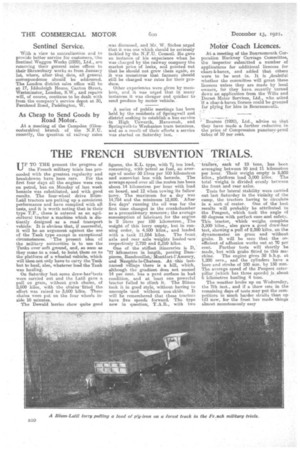THE FRENCH SUBVENTION TRIALS.
Page 8

If you've noticed an error in this article please click here to report it so we can fix it.
UP TO THE present the progress of the French military trials has proceeded with the greatest regularity and breakdowns have been rare. For the first four days all the engines were run on petrol, but on Monday of last week benzole was substituted, and with good results. The four-wheel drive BlarnLatil tractors are putting up a consistent performance and have complied with all tests, and it is worth noting that in their type T.P., there is entered as an agrioultural tractor a machine which is distinctly designed as is road transport vehicle. It is obvious that, if successful, it will be an argument against the use of the Tank type except in exceptional circumstances. The present idea of the military authorities is to use the Tanks over soft ground, and, as soon as they come to a road, to hoist them on to the platform of a wheeled vehicle, which will then not only have to carry the Tank but to haul, also, whatever load the Tank was hauling. On Saturday last. some draw-barltests were carried out and the Latil gave a pull on grass, without grab chains, of 2,600 kilos, with the chainsfitted the effort was raised to 3,600 kilos. These chains were put on the four wheels inside 10 minutes.
The Dewald lorries show quite good
figures, the K.L. type, with 7i ton load, consuming, with petrol as fuel, an average of under 50 litres per 100 kilometres and somewhat less with laenzole. The average speed over all the routes has been about 14 kilometres per hour with load on board, and 12 when towing its fellow lorry. The maximum for a day was 14,754 and the minimum 12,600. After. five days' running the oil was for the first time changed in the crankchamber as a precautionary measure; the average consumption of lubricant for the engine is 2 litres per 100 kilometres., The weight of this lorry empty, but in running order, is 4,580 kilos., and loaded
with a tank 11,054 kilos. The front axle and rear axle weights loaded -arc respectively 2,720 and 8,310 kilos.
One of the stiffest itineraries is D, 77 kilometres in length, passing Dampierre, Rembouillet,%Montfort-l'Arnaury, and Neuphlele-Chatean. At -this lastnamed village there is a hill, which, although the gradient does not exceed 14 per Cent. has a pave surface in bad condition, and at least one powerful tractor failed to climb it. The Bliims took it. in good style, without having to uncouple and without non-skids. It will be remembered that these tractors have five speeds forward. The type now in question, T.A.R., with two
trailers, each of 10 tons, has been averaging between 10 and 11 kilometres per hour. Their weight empty is 5,800 platform load 3,000 kilos. The total weight is divided evenly between the front and rear axles.
Tests for lateral stability were carried out last Saturday in the vicinity of the camp, the tractors having to circulate in a sort of crater. One of the best results will probably be attributed to the Peugeot, which took the angle of 60 degrees with perfect ease and safety. This tractor, which weighs complete 3,500 kilos., also gave a good draw-bar test, showing a pull of 2,300 kilos. on the dynamometer on grass and without grabs. It will be seen that the coefficient of adhesion works out at 70 per cent. Further tests will shortly be made, but with grabs fitted to this ma chine. The engine gives 38 b.h.p. at 1,200 revs., and the cylinders have a bore and stroke of 100 mm. by 150 mm. The average speed of the Peugeot caterpillar (which has three speeds) is about 6 kilometres hauling 4 tons. .
The weather broke up on Wednesday, the 7th inst., and if a thaw sets in the remaining days of testa may put the competitors in much harder straits -than up till now, for the frost has made things almost monotonously easy
































